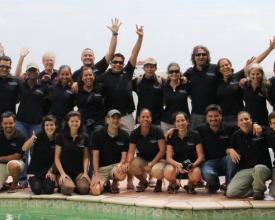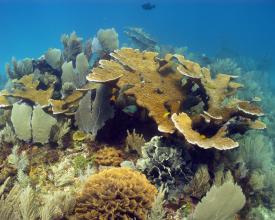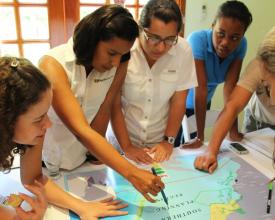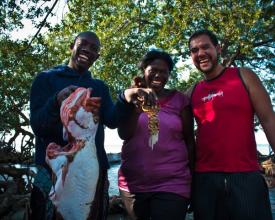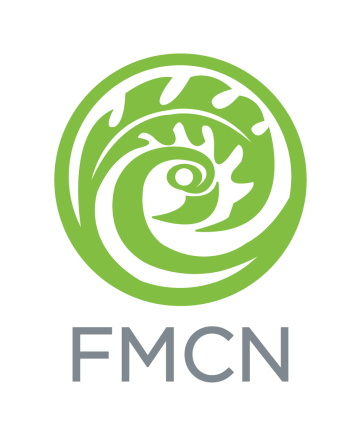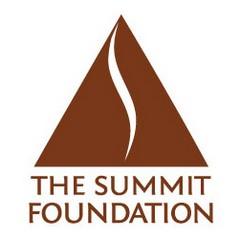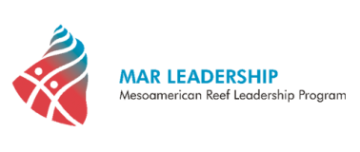
Programa de Liderazgo en el Arrecife Mesoamericano
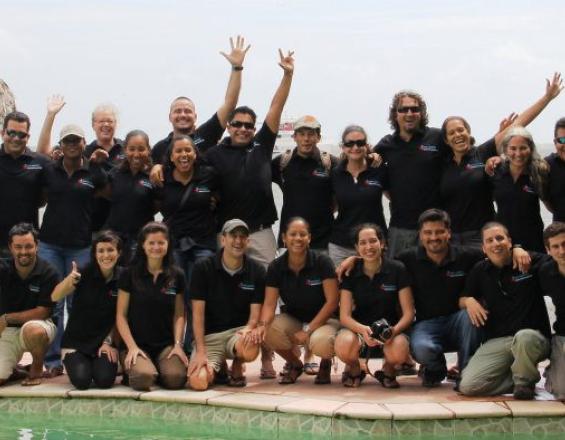
En 2010, el Fondo Mexicano para la Conservación de la Naturaleza (FMCN) y la Fundación Summit lanzaron el Programa Liderazgo en el Arrecife Mesoamericano para acelerar la conservación del Sistema Arrecifal Mesoamericano (SAM) mediante el apoyo a proyectos de conservación de alto impacto y el fortalecimiento de las capacidades y habilidades de liderazgo de jóvenes conservacionistas en México, Belice, Guatemala y Honduras. Hasta la fecha, Liderazgo SAM ha formado a 71 becarios de diferentes orígenes y sectores que ahora aplican las habilidades de este programa en numerosos proyectos de conservación marina en la región del SAM.
Contexto
Défis à relever
- Ecosistemas en condiciones críticas que son cruciales para las comunidades locales y los medios de vida tradicionales
- Residuos sólidos, aguas residuales, sobrepesca severa, escaso desarrollo costero y turístico y amenazas globales como el cambio climático.
- La comunidad conservacionista es pequeña y está dispersa
- Falta de profesionales con experiencia en gestión empresarial, gestión organizativa, planificación, creación de redes y comunicaciones.
Ubicación
Procesar
Resumen del proceso
El Sistema Arrecifal Mesoamericano (SAM) es el segundo en importancia biológica. Sus principales amenazas son la contaminación local de origen terrestre, la sobrepesca severa, el desarrollo costero y turístico deficiente y los impactos del cambio climático. El programa Liderazgo SAM acelera la conservación del SAM mediante proyectos de conservación de alto impacto y replicables, así como mediante el fortalecimiento de las capacidades y habilidades de liderazgo de jóvenes conservacionistas en México, Belice, Guatemala y Honduras. El programa opera a través de "cohortes" de 10-12 becarios de diversos orígenes y profesiones. Un ciclo de cohorte (12 meses) abarca módulos de formación en grupo, formación individualizada, aprendizaje y cooperación entre pares, tutoría, asistencia técnica y oportunidades de creación de redes. Hasta la fecha, MAR-Leadership ha formado a 71 conservacionistas que trabajan en diferentes instituciones y ejecutan proyectos de conservación marina. La conectividad desempeña un papel crucial y el programa se esfuerza por compartir conocimientos y eliminar las barreras tradicionales que a menudo impiden los esfuerzos para proteger el sistema de arrecifes.Los becarios SAM, los expertos invitados y los socios están formando una red vibrante que fortalece las colaboraciones y aumenta los impactos de la conservación en la región.
Bloques de construcción
Nuevas competencias para los líderes de la conservación
Se fortalece la capacidad de los líderes locales de la conservación para que sean más eficaces en el diseño y la ejecución de sus proyectos de conservación de manera que sirvan a los becarios de este programa durante toda su vida.
El Programa Liderazgo SAM ofrece formación en grupo e individual:
Durante los talleres de grupo se forma a los becarios en el diseño de proyectos y se perfeccionan sus capacidades de liderazgo. Entre las competencias que se abordan figuran el desarrollo de estrategias de comunicación eficaces, la oratoria, la negociación y la resolución de conflictos, la gestión del tiempo y el liderazgo en la gestión de equipos.
Para la formación individual, los becarios tienen acceso a un pequeño presupuesto que pueden utilizar para participar en cursos o programas de diploma técnico, clases intensivas de inglés o español, visitas a mentores, visitas a proyectos piloto, prácticas en organizaciones internacionales que se ocupan de temas relacionados con el proyecto del becario, así como la elaboración de estudios de mercado y la generación de datos para reforzar la viabilidad del proyecto de un becario determinado. Estos fondos se gastan de acuerdo con un plan de formación diseñado con aportaciones tanto del personal del programa como de expertos internacionales.
Factores facilitadores
- Un grupo de jóvenes becarios comprometidos para cada cohorte
- Expertos y mentores internacionales que imparten formación sobre diseño de proyectos y habilidades de liderazgo
- Recursos financieros para el funcionamiento del programa
- Financiación inicial para el lanzamiento de proyectos
Lección aprendida
Resultó útil la participación de un consultor que proporciona asesoramiento técnico, cofacilita los cursos de formación y asesora en el diseño del proyecto. En concreto, el consultor ayuda a
- Investigar, revisar y destilar la literatura más actualizada sobre el tema de la cohorte, haciendo hincapié en la región del SAM.
- Sobre la base de la investigación anterior, formular recomendaciones para afinar la visión regional de éxito del programa, así como objetivos claramente definidos, con plazos concretos y mensurables con respecto a las bases de referencia.
- Ayudar al personal del programa a elaborar un perfil del becario ideal para la cohorte y a seleccionar entre 12 y 14 becarios para el programa.
- Dirigir el programa de formación en liderazgo y desarrollo de proyectos de la cohorte.
- Facilitar e identificar recursos humanos para impartir con éxito talleres de formación durante el ciclo de la cohorte.
- Proporcionar tutoría y asistencia técnica a los becarios en la incubación de sus ideas de proyecto para convertirlas en un éxito.
Recursos
Ideas innovadoras a escala regional
El programa Liderazgo SAM busca incubar nuevas ideas de proyectos para convertirlos en proyectos con potencial de replicación (ampliación) a lo largo de la Ecorregión del Arrecife Mesoamericano. Estos proyectos se desarrollan para mostrar impactos de conservación claros y medibles en un horizonte temporal de 3 a 5 años. Cada cohorte tiene un enfoque temático vinculado a las necesidades de conservación de la región. Por ejemplo, en 2010 los proyectos de los becarios se centraron en el desarrollo costero y el turismo; en 2011 en la pesca sostenible y el establecimiento de Áreas Marinas Protegidas (AMP); en 2012 en el establecimiento de una red de reservas marinas multifuncionales; en 2014 en la gestión integrada de residuos sólidos y en 2015 en la conservación y valoración económica de los servicios ecosistémicos de los manglares.
Factores facilitadores
- Compromiso de los becarios de ejecutar sus proyectos
- Apoyo de la organización de los becarios
Lección aprendida
- Aprovechar la experiencia de los becarios y animarles a autoorganizarse en torno a proyectos de aprendizaje y acción (dotados de recursos) les ayuda a desarrollar su capacidad de liderazgo.
- Los proyectos de los becarios tienen más probabilidades de éxito si forman parte del plan de trabajo de su organización.
- La financiación inicial es necesaria para poner en marcha los proyectos.
Oportunidades de establecer contactos para toda la vida
El aprendizaje en grupo, la retroalimentación entre pares y los intercambios entre pares están integrados en el diseño del programa Liderazgo SAM. Esto se combina con oportunidades continuas de trabajo en red virtual para permitir a los becarios desarrollar un grupo de apoyo para sus proyectos actuales y su pasión permanente por la conservación del Arrecife Mesoamericano. Liderazgo SAM busca una red consolidada y activa de Liderazgo SAM en la que los becarios colaboren entre sí y con expertos, comunidades, gobiernos e instituciones académicas, sin importar las fronteras. Forjar conexiones a través de disciplinas, organizaciones y límites geográficos ha sido fundamental para la misión del Liderazgo SAM.
Factores facilitadores
- Mantener el compromiso de los becarios, mantener redes sociales dinámicas y activas y ofrecer ventajas a los antiguos becarios, como becas para cursos o formación, o publicar sus trabajos y noticias.
- Desarrollar estrategias que apoyen las interacciones "de becario a becario". Dado que muchos becarios utilizan Facebook, reclute becarios para que ayuden con la página de Facebook de MAR-Leadership.
- Los becarios disponen de diferentes cantidades de tiempo y energía en función de las circunstancias cambiantes de su vida.
Lección aprendida
- Es necesario aprender los comportamientos y actitudes necesarios para el desarrollo de redes y la gestión organizativa. Es importante formar al personal y a los becarios en los principios y comportamientos de las redes.
- La introducción de herramientas de medios sociales ayuda a los becarios a movilizar apoyos para su propio trabajo y a crear capacidad con herramientas que pueden apoyar su conectividad continua.
Impactos
Impactos biológicos:
A través de sus proyectos, los becarios SAM de las distintas cohortes han promovido y reforzado la protección de numerosas áreas ecológicas y especies de interés a lo largo de la región: se han decretado zonas de repoblación piscícola, se están restaurando arrecifes de coral y regulando especies invasoras.
Impactos económicos:
Se están desarrollando la valoración de los recursos naturales, las alternativas productivas, el sistema de pago por servicios ambientales y las vías de gestión sostenible. Un proyecto comunitario y ecoturístico maya está garantizando el uso sostenible de los recursos naturales, su conservación y el bienestar de la población. Los becarios del SAM también buscan la integración del carbono azul en los mecanismos de mitigación para incentivar a los propietarios de tierras y proteger los ecosistemas de manglares.
Impacto social:
No hay cambio medioambiental sin implicación de todos los sectores de la comunidad. Se necesita una estrategia de partes interesadas clave para llevar a cabo proyectos de conservación en los que la educación ambiental es fundamental. Los becarios SAM de Honduras han integrado la gestión de residuos sólidos y la educación ambiental en el aula verde de Roatán.
A lo largo de varias cohortes, los becarios SAM de Belice han diseñado, probado y reforzado lo que ahora es el programa nacional para la pesca sostenible a pequeña escala basada en licencias: Acceso Gestionado. Este programa está siendo estudiado para su replicación en otros países.
Beneficiarios
- Más de 71 becarios SAM y sus colaboradores de organizaciones de la sociedad civil, organismos gubernamentales o el sector privado
- Alrededor de 2,2 millones de habitantes de comunidades costeras
Objetivos de Desarrollo Sostenible
Historia
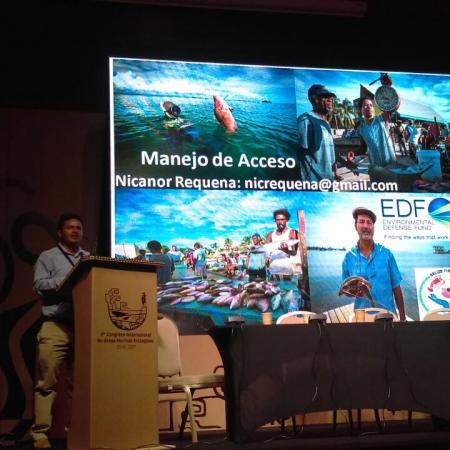
La actividad pesquera en Belice representa importantes ingresos, con 29 millones de dólares estadounidenses en 2012, y emplea a más de 3.000 personas. Hasta hace poco, no se aplicaba ninguna normativa (excepto para la concha) a esta actividad, ya que se consideraba de "libre acceso", por lo que el número incontrolado de pescadores y el número incontrolado de poblaciones explotadas provocaban la sobrepesca y un rápido declive de las poblaciones pesqueras.
Para responder a estas preocupaciones, en 2011, Nicanor Requena, del Fondo de Defensa del Medio Ambiente (EDF), en colaboración con el Departamento de Pesca de Belice, la Wildlife Conservation Society (WCS), el Instituto de Toledo para el Desarrollo y el Medio Ambiente (TIDE) y varias asociaciones de pescadores, desarrollaron el primer sistema de pesca basado en derechos, Managed aAccess, que inicialmente se puso a prueba en las Áreas Marinas Protegidas de Puerto Honduras y Glovers Reef. En 2012, Adriel Castañeda, que trabajaba en el Departamento de Pesca de Belice, se unió al programa MAR L con la idea de dotar a los pescadores de herramientas y conocimientos para convertirlos en administradores informados de los recursos de los que dependen para su subsistencia. Su visión era que, para lograr una pesca sostenible en Belice, los pescadores tenían que convertirse en una parte central de su gestión.
El trabajo en estos lugares piloto iniciales permitió al Departamento de Pesca y a sus socios demostrar que esta herramienta de gestión de la pesca funcionaba y que los pescadores la apoyaban. Tras un amplio trabajo con pescadores y responsables políticos, el Grupo de Trabajo de Acceso Gestionado (un equipo formado por ONG locales, asociaciones de pescadores y cooperativas, bajo la dirección del Departamento de Pesca de Belice) ha implantado el acceso gestionado en todas las aguas territoriales de Belice.
"Ha sido un gran logro. Es el trabajo de las organizaciones miembros del Grupo de Trabajo de Acceso Gestionado de Belice. Esto me llena de energía y seguiré trabajando para conseguir una aplicación satisfactoria en Belice con la esperanza de que podamos compartir lo que hemos hecho en Belice con otros países de la región...". Desde mi punto de vista, el programa Liderazgo SAM ha contribuido a este trabajo fomentando y mejorando la creación de redes entre socios clave tanto a nivel local como regional y ha sido una plataforma muy buena a través de la cual se puede compartir nuestra experiencia", dijo Nicanor.
En la actualidad, el proyecto global de acceso gestionado en Belice se sustenta en una asociación activa entre varios becarios SAM y sus instituciones.
